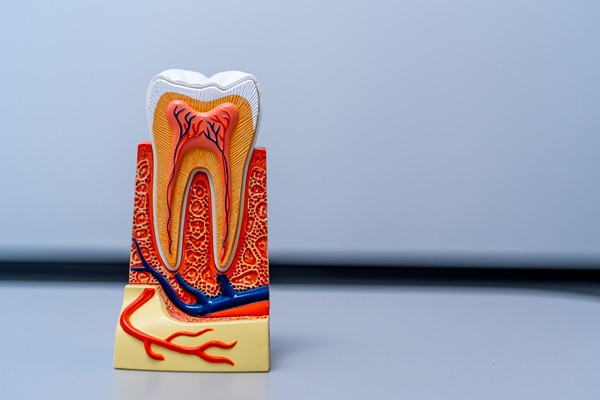Endodontic Therapy for an Infected Tooth

Endodontic therapy, otherwise referred to as root canal therapy, can help those with pain from infected pulp relieve their discomfort and restore the health and function of an affected tooth. By understanding exactly what endodontic therapy is, you can ensure you recognize the signs of infection and get the treatment needed in a timely manner.
Endodontic therapy
Endodontic therapy can be a scary procedure for many patients, and it can be helpful to know what to expect and how the procedure can help treat a damaged tooth in order to relieve some of the anxiety. The following is everything one should know about endodontic therapy, including who needs endodontic therapy, the signs of endodontic issues and how the process works.
What is endodontic therapy?
Endodontic therapy, or root canal therapy, is a procedure performed to remove and replace infected pulp inside of a tooth.
Dental pulp is a soft tissue found deep in our teeth that is vulnerable to an infection, especially if damage has occurred to the tooth. When the pulp becomes infected, it can lead to a lot of pain and sensitivity in the affected area and a need to remove the infected pulp.
Through an endodontic therapy procedure, the infected pulp is removed, and the pain and sensitivity in the patient is alleviated.
Who needs endodontic therapy?
Endodontic therapy is needed in individuals who have developed infected pulp inside of a tooth. There are various reasons why someone may experience infected pulp, including if a tooth has become cracked, chipped or damaged in any manner. Infected pulp and a need for endodontic therapy can also result from too many dental procedures on a certain tooth, and perhaps most prevalently, from serious decay of a tooth’s enamel.
It is important for those who need endodontic therapy to have the procedure done in a timely manner to prevent increased pain or the development of an abscess.
Signs of needing endodontic therapy
There are various major signs that the tooth’s pulp has become infected and endodontic therapy is needed. Here are the most prevalent signs that suggest endodontic therapy is needed:
- Pain in the affected tooth
- Extreme sensitivity
- Soreness to the touch
- Swelling in surrounding area
- Tooth discoloration
If the need for endodontic therapy is suspected, it is important to visit a dentist in a timely manner. The dentist can use oral examination and dental x-rays to determine whether endodontic therapy is needed.
How endodontic therapy works
After the dentist determines endodontic therapy is required to restore the function of the tooth and alleviate the pain, the dentist starts the procedure by administering an anesthetic.
The dentist then opens the crown of the tooth, cleans out the infected tooth pulp and shapes a space for the filling to be administered. A biocompatible material is then sealed into the empty area to serve as a substitute for the removed pulp.
In many instances, a crown is required to fully protect the tooth after the procedure.
Request an appointment here: https://santarosaendodontics.com or call Santa Rosa Endodontics at (707) 409-1177 for an appointment in our Ukiah office.
Recent Posts
A non-surgical root canal is an endodontic procedure known for preserving a tooth affected by severe decay, infection, or trauma, all without incisions in the gum tissue. Many patients become anxious when they hear the term "root canal," yet modern techniques can provide a gentler experience than expected. Endodontists often recommend this treatment when a…
A general dentist can perform basic tasks in tooth care, such as X-rays, oral examinations, filling cavities, and extractions. However, patients may be referred to an endodontist for more complex work, such as certain root canals. When is it likely for a dentist to refer a patient to this dental specialist?While a filling can fix…
Root canal treatment is often the first line of defense for treating teeth with compromised pulp chambers. The pulp chamber is the innermost layer of a tooth, and it stores nerves, blood vessels, and connective tissues. The chamber is sealed off from the rest of the tooth to protect it against bacteria and other irritants…
A root canal can preserve and strengthen a severely damaged or infected tooth. When seeing a root canal dentist, asking informed questions can provide clarity, ease concerns, and improve treatment outcomes. Understanding the procedure helps make the experience more comfortable and ensures you are well-prepared for each step.While each patient's situation is unique, the following…


